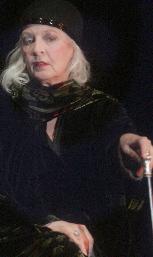SEARCH CurtainUp
REVIEWS
FEATURES
NEWS
Etcetera and
Short Term Listings
LISTINGS
Broadway
Off-Broadway
BOOKS and CDs
OTHER PLACES
Berkshires
London
LA/San Diego
DC
Philadelphia
Elsewhere
QUOTES
On TKTS
LETTERS TO EDITOR
FILM
LINKS
MISCELANEOUS
Free Updates
Masthead
Writing for CurtainUp
What of the Night
By Jerry Weinstein
|
Old people should be killed, you know. There should be a law. This business
of keeping them alive, it's inhuman. If you can't be marvelous, why live at
all? Everyone hates old ladies. They aren't pretty and they can't screw, so
what good are they? |

Jane Alexander
(Photo: Joan Marcus) |
In Jane Alexander's one-woman show, What Of The Night, the difficulty lies in providing an audience a window into the life of the self-described "most well-known, unknown person on earth." It is no easy feat.
The stage of the Lucille Lortel is veiled with a transparent scrim, cordoning off Djuna from scrutiny. Onto it are projected typewritten consonants and vowels randomly strewn as to obscure or eclipse Barnes. Later there are images of Thelma Wood -- the love of Djuna's life -- but it never lifts to reveal Djuna until curtain call.
More a fugue than a narrative, the play uses the occasion of Djuna's birthday as a framing device. Within it she is free to reminisce, flashing back to her years as the belle of the ball and toast of the town. With the doff of a wrap, the straightening of a spine, Alexander finds a range of emotions from ecstacy to remorse as Djuna's affair with Thelma Woods comes crashing to an end. Nightwood, Djuna's masterwork, is every bit her touchstone as is the love affair itself. After finding some success as a journalist Djuna wrote the novel to immortalize the relationship, and perhaps to exorcise demons. The thinly veiled autobiographical account was roundly rejected for both its "perversity" and its avant garde style. Faber & Faber ultimately brought it out and it was championed by T.S. Eliot.
While Djuna experienced fame and recognition, post-publication her best years were behind her. After twenty years in Paris, she returned to NYC's Greenwich Village where she lived in solitude for forty years. Whether listening to a recording of Dylan Thomas reading from her novel, revealing sheathes of praise from the likes of Anais Nin or Thomas (who likened her to Shakespeare), it's hard to take the measure of Djuna's life. A wilful genius she refused to identify herself as gay ("I was never a lesbian; I only loved Thelma, my Robin always flying away. . . I might be anything; if a horse loved me I might be that.") Further, she rejected any responsiblity to mentor those women who deified her for making their lives visible.
Still, there are moments of magic as Alexander tangos at the Arcadia Dance Hall, in an embrace with just-met Thelma. There, frozen in time, is her happiness.
Returning to the present of June 1972 Djuna is alone, kept company only by her past; wishing for a reunion. As might be expected, it's an elusive evening, a glimpse of an outsize talent, made poignant by the prospect that Djuna did not shuffle off this mortail coil for yet another decade.
|
What Of The Night
Co-written by Jane Alexander, Noreen Tomassi, Birgitta Trommler Directed by Birgitta Trommler Cast: Jane Alexander Lighting design: Beverly Emmons Set design: Rob Odorisio Sound design: Fabian Obispo Video design: Dennis Diamon Costume design: Ann Roth Running time: 75 minutes without intermission MCC at the The Lucille Lortel Theater, 121 Christopher Street 3/16/05 to 4/23/05; opening 3/16/05 Performances Tuesday at 7pm; Wednesday-Saturday at 8pm. Saturday and Sunday at 2:30pm. Ticket prices: $50.00; Student rush $15.00, in-person only at box office 30 minutes prior to show; Phone: 212-279-4200; Reviewed by Jerry Weinstein based on April 2nd press performance. |

Easy-on-the budget super gift for yourself and your musical loving friends. Tons of gorgeous pictures.

Retold by Tina Packer of Shakespeare & Co.
Click image to buy.
Our Review

At This Theater

Leonard Maltin's 2005 Movie Guide

Ridiculous!The Theatrical Life & Times of Charles Ludlam

6, 500 Comparative Phrases including 800 Shakespearean Metaphors by CurtainUp's editor.
Click image to buy.
Go here for details and larger image.



